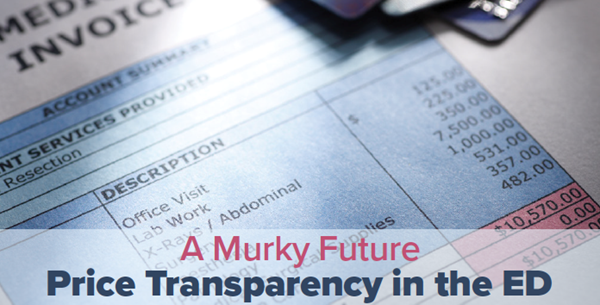It’s no secret that emergency department visits are expensive. The time-sensitive, high-stakes nature of our work is such that services must be provided with the utmost speed and efficiency – often requiring costly, expedited tests to determine whether a patient has a life-threatening illness.
While higher cost might be perceived as a reasonable trade-off for immediate access to high quality emergency care, there remains a monumental problem in how patients are billed for emergency visits.
The actual cost is impossible to determine until after the visit. And no matter what happens, patients are stuck with the bill.
Appropriately, there has been significant public outrage against surprise billing after ED visits. These unexpected charges are multi-factorial and range from physician-dependent items such as rejected out-of-network claims (a.k.a. “balance billing”) to hospital-dependent items such as variable drug costs or facility fees, like radiology services.
With multiple providers and services being involved in even the most basic of cases, it’s easy to see how bills can become incredibly complex and highly variable quite fast.
Amid increasing scrutiny of unclear billing practices, physician and patient advocacy groups alike have advocated for better price transparency.
On January 1, the Centers for Medicare and Medicaid Services (CMS) responded to this by enacting a policy requiring that hospitals “establish and make public a list of their standard charges.”
While well-intended, the policy is purposely vague regarding how hospitals are supposed to accomplish this task.
In the emergency department setting, there is one major conflict of interest that has provided hospitals with an incentive to remain as elusive as possible in the reporting of standard charges in line with this policy.
This, of course, is EMTALA.
The Emergency Medical Treatment and Labor Act is a federal law created in 1986 that mandates for all patients to be evaluated, stabilized, and treated upon presenting to an ED, regardless of their ability to pay. EMTALA opened the door to a social revolution in emergency medicine, transforming all EDs into health care safety nets overnight. It was a major win for the poor and disenfranchised members of American society, who had previously depended on relatively few charity hospitals for their medical care.
The goal and spirit of this act were and remain a core value of emergency physicians, and we continue to provide the most EMTALA-related charity care of any specialty in the house of medicine – by a hefty margin.
So, how does transparent billing interfere with EMTALA?
Unsurprisingly, the answer is money.
Under certain situational interpretations of EMTALA, the act of advertising a price for an emergency service could be perceived as coercive and constitute a costly violation. A single fine can cost up to $50,000 for a hospital and up to $50,000 for a physician. Because of this looming threat, some hospitals have gone to great lengths to place multiple barriers in front of the list of standard emergency department charges.
While price transparency is likely to remain a major issue in the future of emergency medicine, patients will continue to receive emergency care regardless of their ability to pay. Without major changes to the structure of the health care system, it is unlikely that billing practices in the ED will become any simpler in the foreseeable future. As emergency physicians, we must continue to advocate for our patients and strive not only to provide high quality care, but cost-effective care, too.



